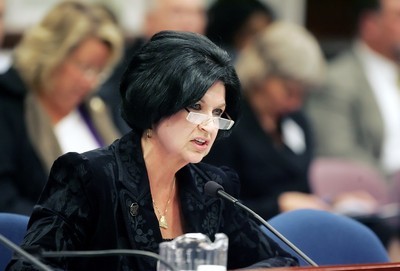Group backs stiffer DUI laws

CARSON CITY — Legislators were urged Monday to tighten Nevada laws to ensure that people convicted of drunken driving in urban areas attend meetings with victims or their loved ones.
Assembly Judiciary Committee members were told the victim-impact sessions must be part of the process, along with fines, possible jail time and other penalties, that drunken drivers undergo so they don’t continue to drink and drive.
Sandy Heverly of Las Vegas-based STOP DUI, said Assembly Bill 209 requires attendance at the victim-impact sessions instead of watching an online video aimed at stopping drunken driving.
Heverly said the in person sessions keep most people from repeat offenses, while the online video approach “bastardizes the purpose and concept” of the victim-impact meetings.
She also said the videos are “a way to make a quick buck with total disregard for the outcome.”
North Las Vegas Justice of the Peace Stephen Dahl opposed the bill, saying he supports the victim-impact sessions but doesn’t want judges to be locked into an “in person or nothing” requirement.
Dahl also said he heard of instances where people were turned away from the monthly sessions and told to show up five hours early to wait in line the next time.
Heverly said people were only turned away once, during stormy weather in December.
Zachary Larson of LRS Systems, which created an online victim-impact program for rural judges, said Heverly was off base to say his company was trying to make a “quick buck.”
Larson said the videos are “a very small part” of what LRS Systems does, and any money generated by the online programs goes to victims.
Assemblyman Mark Manendo, D-Las Vegas, told committee members he might support a bill amendment that gave judges the option of letting offenders skip a victim-impact session if one isn’t available within 60 miles of their homes.
Dahl said flexibility is important because someone traveling, for example, from Ely to Battle Mountain to attend one of the sessions would have a round-trip drive of more than 400 miles.
The committee also reviewed Assembly Bill 210, which requires first-time drunken driving arrestees to have an alcoholism evaluation if their blood-alcohol level was 0.15 percent or higher. That’s nearly double Nevada’s 0.08 blood-alcohol limit in DUI cases.
The bill also lowers from 0.18 to 0.15 the alcohol concentration level in state law that requires a person to serve a sentence rather than go through a treatment program for a first offense.












